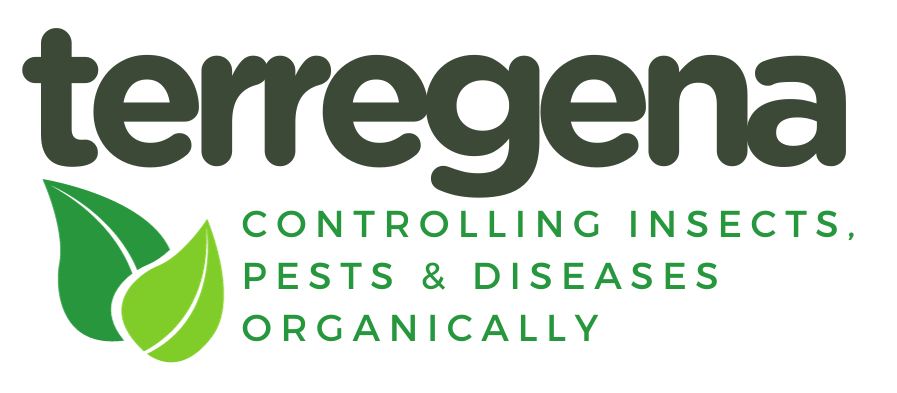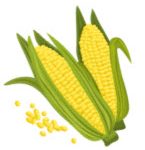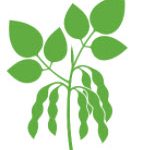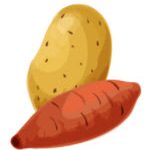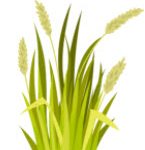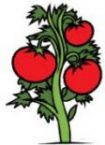Soil Enhancer SPE-120 Organic
Treat Your Seeds & Plants with Beauveria bassiana
Protect & Strengthen Plants as They Grow
Increase Crop Yield
Grow Healthier, Stronger Crops
Beauveria bassiana is a beneficial endophyte. It is a seed enhancer with a symbiotic or mutually beneficial relationship with your plants. Endophytes are microorganisms – such as fungi. They occur naturally, living within plant tissues. The Beauveria bassiana grows at the same rate as its host plant within the intercellular spaces of the plant tissue.
Biological Seed Treatment
Soil and Plant Enhancer SPE-120 with active ingredient Beauveria bassiana is a naturally occurring, symbiotic fungus that lives in the soil, roots, stems, and leaves. SPE-120 grows with the plant!
SPE-120 blends food-grade and certified organic products with Beauveria bassiana. Many certifiers have determined compliance with organic standards. Contact your certifier to add SPE-120 to your plan.
Our soil enhancer SPE-120 is an organic seed enhancer. For non-organic or conventional farming, use our SBb 2.5 seed product. https://terregena.com/seed-inoculant-sbb2-5/
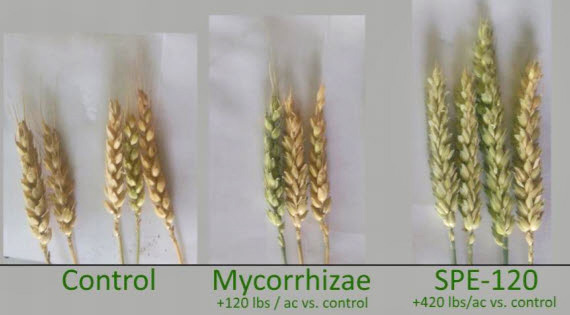
SPE-120 with Beauveria bassiana is a plant symbiont. It is a seed inoculant that provides the plant with:
– Stimulation of the plant’s immune system
– Physical blockage of pathogenic diseases
– Beneficial Plant biochemical interactions
– Occurs naturally in soil but has been killed off by fungicides and tillage
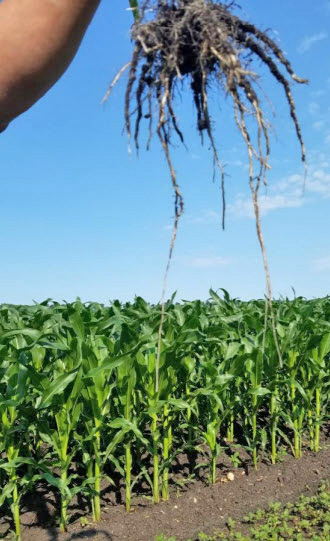
E. Grand Forks, MN. Corn with SPE-120 seed treatment 7/10/2017
Customer Comments
Sweet corn harvested in August had no earworms – South Dakota grower
No loopers in our cabbage – South Dakota vegetable grower
Cole crops had less cabbage loopers – Colorado vegetable grower
Colorado Potato Beetle (CPB) damage was insignificant after using SPE-120 and this was in a field where we had potatoes for 4 years – Ohio vegetable grower

Northern MN Dry beans left SPE-120 treated, right chemical treated, picture taken July 8, 2016
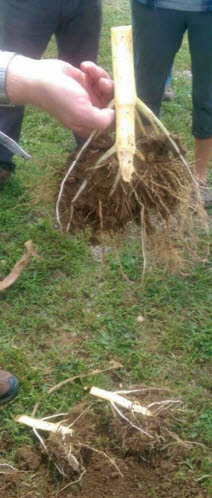
Central Ohio Corn: SPE-120 treated (top) vs. untreated showed better root and stalk development.
Start your crops with health and protection.
Yield and quality is the measure of a successful crop and research illustrates that Beauveria bassiana (Bb) measures up to potential in any given year. Measuring germination, vegetative growth, leaf chlorophyll, leaf size, stem height, root mass, disease resistance, and resistance to insect feeding become determining values. However, these measurements are not easy to see unless you look for them. Researchers do just that to further scientific explanation adding to our understanding.
Choose a Crop
Observed Results
Potatoes- Reports have shown an increase in yield of more than 2000 pounds per acre. With reducing Rhizoctonia, the pickouts were reduced from 23% to 2%.
Minimal damage from Colorado Potato Beetle vs. neighbor.
Soybeans and corn – Increased resilience to flooding and drought
Tomatoes sold to restaurants were noticeably more flavorful. Brix score measured 5 points higher than from non-treated plants. Outdoor plants had almost no insect damage.
A trial using Roundup Ready soybeans with SPE-120 planted in Pewamo soils yield 9.6 bushels more than untreated beans. Soybean aphids and stink bugs were found on non-treated plots only.
Leaf chlorophyll measured 4.2 points higher for treated plants. Plants were visibly taller and healthier.
Another soybean trial, 20 miles separate, found numerous alternative pollinators in the field treated with SPE-120. This was not the case in untreated fields.
Reports from High Plains growers: increased quality; increased yields relating to limited potato psyllid pressure.
Organic corn trials- Increase of up to 20 bushels per acre in Ohio and northeast Iowa.
Strawberries — Faster greening in first six weeks
Reports, trials, and research indicate seeds treated with Soil Plant Enhancer (SPE-120) with Beauveria bassiana have shown improved performance against:
Potatoes
- Potato Psyllids
- Colorado Potato Beetle
- Rhizoctonia
- Anthracnose
- Early Blight
Wheat
- Wheat midge
- Wheat stem sawfly
Onions
- Onion Maggot
- Onion Thrips
Raspberries
- Spotted Wing Drosophila
Corn
- Mycotoxins
- Fusarium
- Goss’s Wilt
- Anthracnose
- Corn Earworm
- Northern Corn Root Worm Beetle
- Western Corn Root Worm Beetle
- European Corn Borer
Soybeans
- Stem Canker
- Stem Borer
- Fusarium Root Rot
- Common Rust
- Anthracnose
Other
- Leafhoppers
- Pea aphids
- Green peach aphids
- Leaf Miner
- Mites
- Whiteflies
- Squash borer
- Grape colaspis
- Apple maggot
- Plum curculio
- Pecan weevil
- Alfalfa weevil
- Cloverleaf weevil
- Cabbage looper
- Armyworm
- Pink bollworm
- Variegated cutworm
- Black cutworm
- Webworm
- Wireworm
- Japanese beetle
